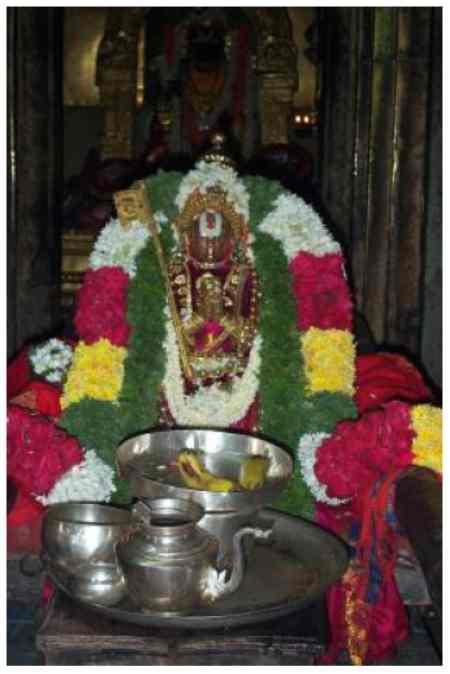
விளக்கவுரை:
“கலியும் கெடும் கண்டு கொண்மின்”, என்று நம்மாழ்வார்; “மேவினேன் அவன் பொன்னடி மேன்மை”, என்று மதுரகவியாழ்வார்; “ஆம் முதல்வன்”, என்று ஆளவந்தார் ஆகிய பலரும் எம்பெருமானாரின் திருஅவதாரத்திற்கு முன்பே, அவரைப் போற்றியபடி இருந்தனர். இப்படியாக உள்ள எம்பெருமானாரின் திருநாமத்தை மட்டுமே நெஞ்சில் கொண்டு, அதனை மட்டுமே தங்கள் பாதுகாப்பு என்று கூரத்தாழ்வான், எம்பார் போன்றவர்கள் இருந்தனர். இவர்கள் இவ்விதம் இருந்த விதத்தை பற்றியும், இவர்களைப் பற்றியே பேசியபடியும், இவர்களைப் பற்றிக் கூறினாலே முகம் மலரும்படியும் ஒரு சிலர் இருக்கக்கூடும். இப்படிப்பட்ட உயர்ந்தவர்களுக்கு எங்கும், எப்போதும், எந்த நிலையிலும் – நான் எனது வாக்கலும், மனதாலும், உடலாலும் எந்தவிதமான தளர்வும் இன்றி கைங்கர்யம் செய்தபடி இருக்கக்கடவேன்.
Let those who cast doubts and are suspicious be so; It is we who are blessed indeed to be the servant and dAsa bhuthars of Ramanuja’s sishyas; servant of the God of Ramanuja, i. e. Sri Ranganthan and the eternal servant of Paramacharyan Sri Ramanuja. – Amudhanaar enjoys in few verses.
Meaning:
I, shall always serve, wholeheartedly and uninterruptedly, with no gap, at all times, under all circumstances, with my words, with my actions and with my thoughts, in all situations,- those Bhagawathas who always think of the graceful nature of other dearest Srivaishnava Bhagawathas who have desired to praise and utter the glorious divine names of Sri Ramanujacharya at all times.
nallaar– those who shine with jnAna vairAgya anushtAnams
paravum– praise
iraamaanusan– Ramanujacharya [His]
thirunaamam– divine names and the glories
namba vallaar thiRatthai– believe due to their jnAnam and their [such greatest bhAgwathas and sishyas’] deeds
yavar maRavaadhavargaL– whoever keeps contemplating and enjoys
avarkkE– for those dAsa bhoothars and bhAgawathAs alone
ellaa idatthilum– in all places
enRum– at all times
e pOdhilum– even when they do not look for or expect [or even when they reject or refuse to accept]
e thozhumbum– all kids of kaimkaryam [service]
sollaal manatthaal karumatthinaal– in speech, thought and actions [manas, vaak and kaayam]
sOrvu anRi– without getting tired or without any gap due to laziness
seyvan– will perform
The moment the prathivaadhis [other religion personnel who argue] hear the name Ramanuja they start disappearing from the scene. The same is mentioned by Swami Desikan in 51st verse of YathirAja Saptathi-
vikalpAdOpEna sruthipathamasEsham … kalaha:
Capricious carping based on fallacious reasoning is the way for some contestants. They tend to cross question everything, pointing out an alternative possibility for every thesis, even if it is unreasonable. By such humbugs, they tend to pollute and confuse the Vedic path. The annoying noise of these wild elephants will die the moment the name of Ramanuja is announced.
Like Narayana saranagathi manthra, Ramanuja saranagathi manthram is also equally powerful, if not more. Thus EmperumAnAr Thirunaamam grants everything to us.
As posted by Sri Sampath Rengarajan Swami: Since Sri rAmAnujar is the pradhAna AchAryAL for all SriviashnavaLs, chanting his thiru nAmam and thinking of his thiruvadi itself is considered as pradhAna manthram and yAgam. Sri thiru arangatthu amudhanAr delivered this anthAthi in such a way that each and every pAsuram has the “manthram” or manthrA embedded in it. Such manthram is none other than the thiru namAm of our pradhAna AchAryAn Sri irAmanusar. ie the name “irAmAnusan” is placed in each and every pasuram and for a total of 108 times.
Many slOkams have the beeja aksharams embedded in it as similar to being hard coded. Some examples are Sri Hayagreeva slOkam, Sri Garuda panchAsat and so on. Since some of the beeja manthrams are not advisable to be chanted by everyone these are embedded by our poorvA chAryALs in slOkams that everyone can chant and derive the palans of chanting these beeja aksharams. In the same way, “SrimathE rAmAnujAya namaha” is embedded in each pAsuram and so for 108 times. Those who can recite this anthAthi gets the fruits of chanting the pradhAna AchAryA thaniyan 108 times. Thus it is also known or called as prapanna sAvithri.
In Sri Vishnu purAnam it is said that during kaliyugam mere doing nAma japam will itself lead one to mOksham. It is understood that such chanting will lead one to doing saranAgathi through a sadhAchAryAL. The reference to nAma japam in Sri Vishnu purAnam can be considered as a direct reference to chanting irAmAnuja nooRRu anthAthi. The name “rAmA” and “anujA” has the “rAma” saptham in it. Every one knows the power our Sri rAma nAmam. In addition to it this name also has anujA in it. anuja is generally meant as younger brother. Since an younger brother is a dAsan to elder brother (here it is empurumAn Sri rAmA is the elder brother) the combined word also means the one is a dAsan to Sri rAmA. Thus the word rAmAnuja itself becomes a secret code or manthra for everyone. It is all the more important for prapannAs as it is the thiru nAmam of the most revered AchAryAn. All our AchAryAs in Srivaishnavam recited their AchAryA’s thaniyan during their last breath. Thus, reciting AchAryA thanian is so important and is sAvithri or the pradhAna manthram for a prapannA [Thanks to Sri Sampath Rengi for his sweet write up]
Source:









